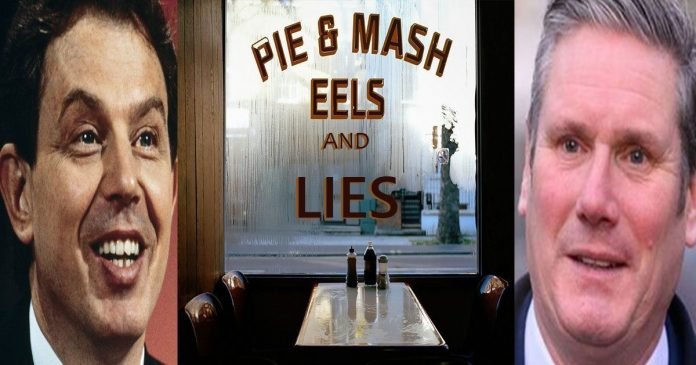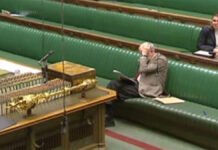‘Political language – and with variations, this is true of all political parties, from Conservatives to Anarchists – is designed to make lies sound truthful and murder respectable, and to give an appearance of solidity to pure wind.’ – George Orwell
Lord Mandelson’s famous “lose, lose, Blair, Blair, lose” line peddles an alluring myth – that New Labour’s victories offer a roadmap back to power. But peel back the nostalgia and his “undisputable truths” dissolve into lies.
Yes, Blair won elections by moving Labour to the centre and adopting a neoliberal posture. But at what cost? The “golden age” backdrop fades when you examine the impacts on ordinary people – privatisation, insecure work, widening inequality. New Labour’s victories bred new defeats for the working class.
Yet Starmer pushes the same spin and policies, hoping to reheat Blairism for today’s voters. He thinks slick branding can mask an agenda that ultimately serves the elite. But the people he’s marketing to remember the instability of the neoliberal era. They feel the effects of its failed dogmas still.
However clever the messaging, you can’t sell what has already been rejected. Workers want change that addresses their lived reality, not more Mandelson manipulation. They see the folly in cosplaying 1997 while ignoring the damage it inflicted.
Some “undisputable truths” are only undisputable until you dispute them. The illusion of New Labour’s glory days can’t survive scrutiny. Starmer would be wise to examine their lessons more closely, rather than resurrecting spin detached from substance. people are demanding real solutions, not just slogans and style divorced from the social change they crave.
But you can’t sell spoiled goods twice. Those left behind by Mandelson’s “progress” won’t be fooled again. They recognize Starmer’s agenda serves the same establishment that abandoned them.
Victories built on spin fail the test of time. Eventually, the facade crumbles, exposing the cynicism underneath. Starmer can try repackaging New Labour, but its legacy is now clear – inequality, insecurity, Iraq.
Blairism died because its “victories” helped the few, not the many. No amount of Mandelson’s magical thinking will revive its rotten core. Lies lose their power once people have experienced the reality.
And it is that reality that our guest author author Gavin Lewis deconstructs the myth of Blair’s golden age…
This article first appeared in the ARENA
The myth of Blair’s golden age…
There is presently circulating in Britain a public petition against Tony Blair being given a knighthood. At the time of writing it had received more than 1.1 million signatures. Yet, despite widespread disdain for Blair and the political subversion he represents, the UK Labour Party is once again subject to neoliberal capture.
After loudly running as a socialist, Labour’s new leader, Kier Starmer, has reneged on his redistributive pro-worker campaign promises and reimposed minority right-wing supremacy in the party’s positions of official enforcement, while purging the party of its socialist rank and file and even leftist local councillors. This sociological and political-representative abnormality raises some basic questions. Contrary to the normalising propaganda of corporate media, is neoliberalism actually anything at all to do with progressive movements, and, in particular, the Labour Party? Are UK Labour and other such subverted parties globally that are ostensibly of the Left still worth voting for?
Evidence from the previous era of neoliberal entryism—the New Labour governments of Blair, and later of Gordon Brown—demonstrates that the answer to these questions is no. The corporate media now objecting to the public petition against Blair’s knighthood invoke imaginary domestic achievements on Blair’s part. But the reality is that this era was characterised by a massive redistribution of resources away from the general public and the public commons and towards sustaining a regime of right-wing tax breaks for the super-rich and the corporate elite—otherwise known as the agenda of Britain’s Conservative Party. This redistribution involved the supposedly progressive section of the professional political class acting against the material interests of the people they were paid to represent.
HOUSING POLICY
In housing policies, there were widespread victims of the tax-break agenda for the rich. These were a result of New Labour’s strategy of forcing up long-established subsidised rents for communal social housing towards market levels, while refusing to re-establish council house building to historical norms. New Labour’s social housing supply in this era was even less than previous Thatcherite levels and was largely abandoned to the provisions of housing associations—smaller-scale organisations that operated on a marketised third-sector model and therefore were beyond local democratic control. Likewise in the United States there was a retreat from Lyndon Johnson’s Housing and Urban Development Act of 1965 that no neoliberal Democrat President was eager or even willing to buck.
The result of restricted UK housing provision, not unlike in the United States, was a bonanza for land speculators, property owners and private landlords, with the losers those citizens now having to spend anything from half to two-thirds of their income on housing costs. Those who lost out were predominantly Labour-supporting and -voting demographics. The policy under assault—subsidised social housing provision—had been a historic achievement of Labour, originating in Clement Attlee’s 1945 Labour government’s agenda of slum clearance, which produced a million new council-house homes.
WELFARE AND LOW-WAGE EMPLOYMENT
In support of the low-tax agenda, Blairite neoliberal New Labour cut lone parent benefits for single mothers, and broader access to welfare provision, while stigmatising the sick and poor as ‘scroungers…part of a culture of dependency’. (This smear is now widely recognised as a New Right position.) By comparison, previously in the Labour Party—and elsewhere—welfare provision was viewed as having many social benefits.
Welfare prevented the poor from being priced into unscrupulous exploitative employment models. It prevented the poor from being priced via poverty into desperate thievery. Welfare alleviated potential causes of physically abusive criminality originating in socio-economic and psychological alienation and deprivation. Fairer distribution of national income—minimising differences between the poor and the super-rich—was also regarded as helping to maintain democratic cohesion. Globally, support for state social financial maintenance has included feminist Wages for Housework activism, giving rise to Basic Income Guarantee campaigns. It has therefore been regarded as an enabler of democratic participation and, particularly, a mechanism for rewarding caring work for societal good, particularly by women, which the market fails to fund.
In this example of Blairite cuts, the victims would again be Labour-supporting and -voting communities, and the resulting public service provision deprivation—replicated across the various sectors—would particularly impact on unemployed members of Generation Z, economically dispossessed lone mothers, women carers, working-class elderly needing basic state pension support, and many others. Again, the policy being attacked by neoliberal entryists into the Labour Party was once a traditional Labour position, in this case, Prime Minister Harold Wilson’s 1964 government’s provision of welfare benefits.
This economic service to power and subversion of long-held political principle was not restricted to the United Kingdom. The Clinton insurgency in the US Democrat Party produced a presidency that enforced welfare to working-poverty policies—i.e. the poor working for basic welfare subsistence levels or less. Michael Moore’s Bowling for Columbine (2002) cited the example of six-year-old Kayla Rolland, who was shot and killed by an equally young classmate. The child perpetrator got hold of a gun in the absence of his mother, who had been forced out of the house and into holding down multiple Clinton-dictated minimum-wage jobs.
Similarly, in the absence of humane social provision, the Clintons (Hillary always marketed herself as an equal partner in the presidency) imposed the notorious ‘three-strikes’ mass-incarceration policy, which secured the United States’ position as the world’s foremost imprisoner of its own citizens. This policy was conjured up against the background of the Clintons taking ‘donations’ from the privatised-prison lobby—something that continued during Hillary Clinton’s presidential campaigning. The result, as Michelle Alexander summarises in The New Jim Crow, has been that ‘More African American adults are under correctional control today—in prison or jail, on probation or parole—than were enslaved in 1850, a decade before the Civil War began’.
To put this in context, the practices of the Clinton insurgency were the opposite of every other Democrat president from Roosevelt to Carter. Its extension of Reaganite policies had nothing in common with Roosevelt’s New Deal, or the Great Society program that evolved from the Kennedy and Johnson agendas. The money that once would have alleviated the condition of the welfare poor was instead used to line the privatised pockets of those now imprisoning them. It was a similar penal story in Britain: ‘under Tony Blair, the Labour government continued to privatise more prisons, and by 2012, the UK had the most privatised prison system in Europe; with 15% of the inmate population detained in a private prison’. The Justice Gap similarly confirms that ‘Privatised incarceration has prospered under the governments of both the right (Cameron, Thatcher, Major) and the centre left (Blair, Brown)’.
In the United Kingdom, the welfare to working-poverty agenda was augmented by one of New Labour’s most manipulatively deceptive policies: the 1998 introduction of a minimum wage. For the first ten years of its existence this policy had no punitive dimension. If an employer was caught withholding the basic minimum wage from workers, all they had to do was offer to repay the difference—in essence, the worst they got was an interest-free loan from the workers. At its introduction, the minimum wage was so low in comparison to rents in most parts of the country that it didn’t match the basic subsistence package of unemployment welfare, housing benefit, local council tax exemption and free prescriptions. Which prompts the question: what was its real point?
The minimum-wage legislation was used as a label of respectability for poverty employment into which the welfare poor were institutionally forced, regardless of how economically destructive this was for them. Rather than help the poor, the minimum wage functioned as a service to big business, increasing the supply of cheap labour to exploitative employers—extended supply also thereby helping to suppress wage levels. The legislation so failed the poor that a grassroots Living Wage Campaign was launched a mere three years after its introduction.
Working under the Blair/Brown governments was also made more difficult by the introduction of casualisation, which was spun as ‘flexibility’ but became known as ‘the gig economy’, and which is now all too familiar to us as precarity. The damage done by Conservatives and then New Labour neoliberals to the UK worker is best illustrated by comparison with the 1970s. Then, most employers honoured the Trade Union Congress’s official working week of forty hours or five eight-hour days. (Its progressive commitment, ‘A resolution for the 35-hour working week was unanimously adopted by the TUC in 1972’, remains unfulfilled.) In the 1970s overtime in excess of these hours was usually paid at time-and-a-half. Public holidays were paid at double time. Religious holidays—for example, Christmas Day—were paid at triple time. Fifty years later, a vast proportion of retail and catering jobs are paid on multiple four-hour contracts designed to circumvent the need to resource even basic lunchbreaks.
Exacerbating these problems, politicians facilitated the export of Western manufacturing jobs to foreign sweatshop economies. This was despite the fact that these industries were national assets, and their well-paid workers’ wages were advantageously spent in our democracies. The ongoing social costs are borne by the general public. The environmental costs of moving goods globally that could be made locally are borne by the planet. And local social and environmental manufacturing standards in—often non-democratic—foreign sweatshop economies are frequently beyond Western scrutiny or remediation.
EDUCATION
If the minimum wage was one of New Labour’s most manipulative policies, abolishing the mandatory student maintenance grant and introducing tuition fees for university education was its most blatant.
Free education was a principle well established prior to New Labour’s time as a collective societal ideal. It produced a better citizenry. Not having to pay off student debts meant that talent could be vocationally distributed evenly throughout society, with the well educated even able to spend time in the voluntary sector. Whatever material benefit it was to the individual was far outweighed by its financial benefit to employers, who harvested the surplus value of this educated labour. Funding education via progressive taxation, including on the rich, therefore made sense.
But instead of continuously resourcing this agenda, Blair and Brown’s New Labour favoured the low-tax demands of the Murdoch press and various sites of vested interest. Neoliberal politicians, who had benefited from student support themselves, would pull up after them the ladder of economic opportunity for younger generations.
The grant policy provision consequently cut and subverted had its origins in the 1962 Education Act brought in during the last days of Harold Macmillan’s Tory government (and made non-means-tested a year later under Harold Wilson’s Labour government). Since that time the only prime minister to make students’ lives financially more difficult was Margaret Thatcher, whose government abolished students’ entitlement to housing benefits to cover rental costs. In abolishing the student grant and introducing tuition fees, Blair and Brown’s New Labour had, incredibly, gone so far to the extreme Right that they were now beyond even the Tory Macmillan government, which had introduced the social provision, and every post-war Tory prime minister from Macmillan onwards, including Ted Heath, Margaret Thatcher and John Major, who had all kept the policy in place.
American youth might similarly claim that their situation has gone backwards since the 1963 and 1965 Higher Education Acts, parts of which aimed to prevent drop-out rates caused by financial hardship.
HEALTH AND PUBLIC SERVICES
In April 2021 UK daytime television personality Kate Garraway revealed that her husband, Derek Draper, though still too ill to fully speak, had been discharged from hospital after treatment for COVID-19. Instead of being shown the door as soon as procedures were completed, had Draper been ill in the 1970s he would have been treated to full recovery via a network of NHS nursing and convalescent homes, which have now been sold off. The Fire Brigades Union (FBU) experienced similar cuts to its provision under Blair and, previously, under Thatcher. Researcher Andrew O’Hagan noted in relation to the notorious Grenfell fire tragedy that ‘under Blair, “half the fire cover within four miles of Grenfell Tower” vanished in five years’. The BBC reported 227 police station closures under New Labour from 1997 to 2004.
Draper’s previous job had been as a spin doctor for New Labour. Despite cuts, the Blair government’s spin doctors repeatedly made unsubstantiated claims about record investment in health and public services—and usually failed to corroborate ‘record’ figures as a percentage of GDP or per head of population. Ironically, it’s possible that Draper may have done the public relations for his own subsequent under-resourced health treatment.
Health and public services had previously been run on a military managerial model. The ‘cradle to grave’ ethos dictated that the public need for treatment and services be satisfied in the same way that a military target would be definitively taken in a war. Subsequently impeding this, in the Thatcherite era some of Britain’s upper tax bands and corporation tax rates were cut, and this lost revenue negatively impacted public service provision. When New Labour came to power, instead of restoring the lost progressive tax take-up they switched to a post-Fordist just-in-time managerial model based on Japan’s 1980s Toyota car-manufacturing system.
One of the main characteristics of the Toyota system was rationing the progression of car components to the very last moment of need, usually via computer technology. A second significant characteristic was a two-tier workforce, which sidestepped the need for universal skill and pay standards, and also meant the system wouldn’t attempt to resource excess capacity to meet unexpected highs in demand. During high demand the casualised de-skilled or sometimes ‘temping’ second tier could be called upon.
In previous years of the NHS, if someone collapsed in the street, was taken to emergency and was there diagnosed with a serious condition, they would likely be given a bed and told a consultant would see them in a day or two. Under just-in-time managerialism, nowadays a patient is more likely to be given painkillers and told to go home and see their GP, who will put them in queues for a consultant and/or further tests. These methods are used to ration and regulate the progress of the patient through the system in the manner of car parts.
Indicative of this was a case whose policy relevance the corporate media either failed or were unwilling to recognise. Under New Labour, in 2006 Ipswich Hospital NHS Trust was fined £2.5 million for treating too many patients, too quickly, by East Suffolk Primary Care Trust (a fragmented ‘trust’ system having replaced the national military managerial model). Significantly, despite available hospital and medical staff, a policy known as the 122-day rule was imposed, which set the wait for treatment at a minimum of four months. In simple terms, the system—often using queuing for the testing regime as form of rationing—was economically designed to prevent suffering patients from being treated in less than a third of a year.
Perhaps most illustrative of New Labour’s public-provision deceit was the use of the two-tier workforce. If the government was really providing ‘record’ public-service investment, why instead of resourcing adequate teacher numbers did it invent the position of teaching assistant? Why instead of funding adequate police numbers did it invent community support wardens? Why instead of providing adequate numbers of doctors did it expand prescription-writing responsibilities to nurses and pharmacists? And instead of ensuring adequate numbers of nurses, why was the position of health assistant invented? Many of these invented positions actually functioned as service-rationing gatekeeping posts. For example, to get access to a police officer a citizen now usually must go through a civilian support officer.
FOREIGN POLICY
Anyone who still denies the foreign policy offences of Blair and other neoliberal politicians, including the wholesale killings of civilians and the torture operations of Western security services, is obviously too partisan to be convinced now. But it is true that just as Blair and US neoliberals have presided over a massive degradation of public services and socioeconomic equality, they have also reversed humanitarian progress in postwar Western foreign policy.
Prior to Blair, and reflecting a mixed reality of anti-racist public sentiment, anti-colonial uprisings, and economic practicalities, the West participated in a process of decolonisation. The people of India, Kenya, Uganda and Nigeria, and eventually those of Malaysia and Singapore, reclaimed their countries from Britain. Labour Prime Minister Harold Wilson blocked Britain from following the United States into the war in Vietnam. According to public sentiment, never again should white Westerners be permitted to conquer and interfere in the evolution of the Black and Brown homelands of the world. Western imperialism was increasingly regarded as racist.
Given that those subsequently victimised had nothing to do with the September 11 attacks and did not even share a culture with the attackers, the rationalisations for the new imperialism do not withstand much scrutiny. We do know a strong element in recent Western conquest has been oil, raw materials and strategic dominance. The social, environmental and economic implausibility of the global trade system has already been mentioned. Economically, it can only be made to work via excessive supplies of fuel at an unfeasibly low cost. Fundamentally, neoliberals have presided over a system that is responsible for more poverty, inequality and misery domestically, fuelled by global killing, warmongering and environmental damage. Blair played a unique role in British foreign affairs in his period of government and has been proven to have lied to the British people.
* * *
Socialist, social-democratic and oppositional parties have always had left and right sections. But there is little in modern history that equates to the globally bribed and corporate-lobbied subversion of labour parties in recent decades. Consequently, in the United States, neoliberal entryists are often referred to today as Republicrats, and in the United Kingdom, they are known as Red Tories or Tory-lite. Social progress has been thrown into reverse, and makes a mockery of (already long-disputed) notions of the onward march of Western civilisation. This has all been facilitated by spin and the wilful collapse of the fourth estate in the ra-ra support of ‘third-wayer’ ideology.
The reality of neoliberals making citizens’ lives worse in every department is well-documented voter collapse and membership destruction. In 1997 Blair came to power on an anti-Tory-corruption vote of 13.5 million. By the 2001 election he’d lost nearly three million of these, including a million voters who had turned out for Labour leadership predecessor Neil Kinnock. He lost another million voters in 2005. Gordon Brown dragged the party down further, to an astonishing 8.5 million, in 2010. Currently, Labour’s grassroots twitter pollsters and amateur-historian bloggers are documenting Starmer’s disasters. Foremost among these, Rachael Swindon notes:
I don’t think it’s unreasonable to see how the great electable Starmer is getting on, when it comes to the only poll that really matters. Hartlepool lost to the Tories—Corbyn won the seat twice. 327 council seats have been lost, as well as control of 8 councils. They won a humiliating 1.6% of the vote at Chesham and Amersham, which was Labour’s worst result ever.A majority of 3,500 in Batley and Spen was turned into a majority of just 335. And just this week in the North Shropshire by-election the Labour vote collapsed by 12.4%, picking up just 9.7% of the overall vote.
It is not a case of whether progressives should be asking their grassroots supporters to vote for neoliberal compromise. As Starmer is now discovering, not only do turkeys not vote for Christmas but also they do not take the trip from their sofa down to the polling station.
Starmer is the inheritor of the Blairite neoliberal economic model and political spin project. However, the people to whom he is trying to market his agenda are victims of past neoliberal policy across housing, welfare, employment and health. Many are still paying off Blair’s student loans. Lived economic actuality is inevitably blocking voter engagement. The reality of parasitic neoliberal entryism is the potential death of parties across the globe, like Labour, that once stood for the good of all.
ABOUT THE AUTHOR
GAVIN LEWIS
Gavin Lewis is a freelance Black British mixed-race writer and academic. He has published in Australia, the United Kingdom, Canada and the United States on film, media, politics, cultural theory, race, and representation. He has taught critical theory and film and cultural studies at a number of British universities. He is a member of the British trade union Bectu.
Support Independent Journalism Today
Our unwavering dedication is to provide you with unbiased news, diverse perspectives, and insightful opinions. We're on a mission to ensure that those in positions of power are held accountable for their actions, but we can't do it alone. Labour Heartlands is primarily funded by me, Paul Knaggs, and by the generous contributions of readers like you. Your donations keep us going and help us uphold the principles of independent journalism. Join us in our quest for truth, transparency, and accountability – donate today and be a part of our mission!
Like everyone else, we're facing challenges, and we need your help to stay online and continue providing crucial journalism. Every contribution, no matter how small, goes a long way in helping us thrive. By becoming one of our donors, you become a vital part of our mission to uncover the truth and uphold the values of democracy.
While we maintain our independence from political affiliations, we stand united against corruption, injustice, and the erosion of free speech, truth, and democracy. We believe in the power of accurate information in a democracy, and we consider facts non-negotiable.
Your support, no matter the amount, can make a significant impact. Together, we can make a difference and continue our journey toward a more informed and just society.
Thank you for supporting Labour Heartlands












